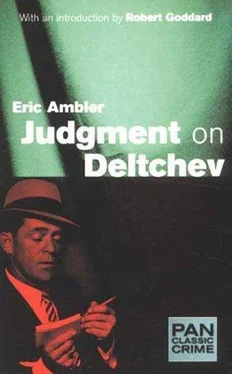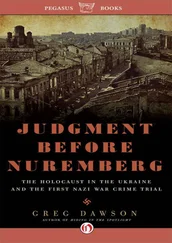Eric Ambler - Judgment on Deltchev
Здесь есть возможность читать онлайн «Eric Ambler - Judgment on Deltchev» весь текст электронной книги совершенно бесплатно (целиком полную версию без сокращений). В некоторых случаях можно слушать аудио, скачать через торрент в формате fb2 и присутствует краткое содержание. Год выпуска: 1977, ISBN: 1977, Издательство: Vintage, Жанр: Криминальный детектив, на английском языке. Описание произведения, (предисловие) а так же отзывы посетителей доступны на портале библиотеки ЛибКат.
- Название:Judgment on Deltchev
- Автор:
- Издательство:Vintage
- Жанр:
- Год:1977
- ISBN:9780307049971
- Рейтинг книги:4 / 5. Голосов: 1
-
Избранное:Добавить в избранное
- Отзывы:
-
Ваша оценка:
- 80
- 1
- 2
- 3
- 4
- 5
Judgment on Deltchev: краткое содержание, описание и аннотация
Предлагаем к чтению аннотацию, описание, краткое содержание или предисловие (зависит от того, что написал сам автор книги «Judgment on Deltchev»). Если вы не нашли необходимую информацию о книге — напишите в комментариях, мы постараемся отыскать её.
Judgment on Deltchev — читать онлайн бесплатно полную книгу (весь текст) целиком
Ниже представлен текст книги, разбитый по страницам. Система сохранения места последней прочитанной страницы, позволяет с удобством читать онлайн бесплатно книгу «Judgment on Deltchev», без необходимости каждый раз заново искать на чём Вы остановились. Поставьте закладку, и сможете в любой момент перейти на страницу, на которой закончили чтение.
Интервал:
Закладка:
‘Yes.’ There seemed nothing else to say.
‘But a picture that will not be seen.’
‘Because Philip is in Athens.’
He held up a finger. ‘And because I am here.’
‘I don’t understand.’
‘You will see now why I wish you to understand. The one obstacle is Aleko’s man — one of those who tried to kill you — the one who was to have been with Philip and me. In one hour’s time he will go to a rendezvous to meet us. If we do not arrive he will go to Aleko to warn him, and when Aleko knows that Philip is not there he will not fire. Brankovitch’s life will be saved.’
‘I see.’
‘But if I stop this man, Aleko will fire. Brankovitch will die, and because there is no Philip to arrest, Vukashin will have to take Aleko. And when Philip has told his story to you and it is ringing round the world, Vukashin’s day will begin to end. That is, if I stop this man.’
I said nothing.
For a moment he continued to stare out of the window; then he turned to face me, his self-assurance gone, his face working grotesquely. ‘Do I stop him, Mr Foster?’ he demanded. ‘You tell me!’
I stared at him, and he read my thoughts.
He shook his head. ‘No, Mr Foster, it is not in your hands. There is nobody here for you to tell this story to. That is if you yourself wish to live. Warn Brankovitch, and you will be rewarded by him with a bullet. Warn Vukashin and it will be the same. You know too much for either’s safety.’
‘There’s our legation. They could warn Brankovitch.’
‘Then you would be killing me instead. I do not think you will choose that alternative. You have no moral dilemma, Mr Foster. It is my own I put to you.’
I was silent.
He sat down and gazed suddenly into space for a moment. ‘Do you know America well?’ he asked suddenly.
‘Not very well.’
‘No,’ he said slowly, ‘neither do I.’
He was silent again. I did not speak. I knew, as if he were thinking aloud, that he was submitting his problem to the judgment of Passaic, New Jersey, Oakland, California, and Hagerstown, Maryland. It was perhaps as good a way of resolving it as any other.
When at last he stood up he was as calm and businesslike as the day we had met. He took an envelope out of his pocket and handed it to me.
‘Your ticket for the press box at the anniversary parade, Mr Foster. I should have given it to you before. Even after what has happened, I do not see that there can be any objection to your using it. Your train, I would remind you, is at five. Have you money?’
‘Yes, thanks.’
He held out his hand. ‘I will try to get to the station to look after you, but there will be the cables and so on to attend to. You will forgive me if I cannot make it?’
I shook hands with him. ‘Yes, of course. Thank you very much for all your help.’
He put up a protesting hand. ‘A pleasure, Mr Foster.’
He turned away briskly, picked up his briefcase, and walked to the door. Then he paused.
‘You’re welcome,’ he added, and went.
CHAPTER TWENTY
The parade began at two o’clock.
It was only a quarter of a mile or so from the hotel to the Square, but the crowds along the route of the parade and in the streets approaching the Square were dense. It took me a long time to get through. The day was very warm and I felt tired and ill and frightened. I had not eaten any lunch. My legs were like paper and I kept thinking that I had lost something valuable. The sensation was curiously familiar. I had felt like that once before. And then I remembered: it had been when I was walking back to a hotel in Seville after seeing my first and only bullfight.
The press box was in a wooden stand built over the cathedral steps and at right-angles to the front of the palace. The parade would pass below it, then bear left to march past the saluting base halfway up the palace steps. There a waist-high balustrade had been erected. It was draped with flags, and on the step below, flowers were banked to give an appearance of depth to the structure. Behind and above it were the crowded boxes of the lesser dignitaries. The whole Square was a mass of flags and brilliantly coloured flowers. The façades of the buildings that formed the square were mostly of a honey-coloured stone, but the paving had been spread with white sand, and in the bright hot sunshine the effect was dazzling.
It was five minutes to the hour when I got there, and all but a few seats in the box were already filled. I could see the back of Sibley’s head near the front. Nearly everyone had sunglasses, but I had forgotten mine, and the glare from the sand was painful. Somewhere a military band was playing, and every now and then a section of the crowd would raise a cheer. Heads would turn at the sound, but the cheer would die away. I looked at the rooftops. There was a canopy over the stand I was in and I could see only a small section of them. From there to the saluting base was a little over two hundred yards. At that range even a recruit could hit a man with one burst from an automatic gun. Perhaps even now an eye was peering through sights at the palace steps.
I wiped my face and neck with my handkerchief and looked at the official programme. A duplicated translation had been slipped into it for the benefit of us foreigners. The parade would symbolize the plough and the sword in harmony together. First would come the floats carrying the tableaux of the various industries and crafts. Then the massed representatives of sport and culture. Finally the parade of military and air power. The whole parade would be led by a special tableau depicting the victory of the People’s Party. This tableau would halt before the Ministry of the Interior to summon the Party leaders to witness the parade, the visible demonstration of the triumph of their work for the Motherland.
I had seen this float lurking in a side street just off the square. It was a huge affair mounted on a platform carried by an aircraft transportation truck. Art, Science, Industry, Agriculture, and Armed Might, each with its subsidiary tableau, were grouped round a white flag-decked plinth supporting a huge Winged Victory in wood and plaster. The subsidiary tableaux had the usual props: for Industry there was an anvil, for Science a retort on a bench, for Agriculture a plough and so on. There were brackets and ledges jutting out from the sides of the plinth obviously for the use of the girls in voluminous white robes who would presently drape themselves round the feet of the Victory.
At eight minutes past two another band entered into the Square and formed up round the statue in the centre. Then the bodyguards marched in with machine pistols at the ready and to the accompaniment of excited cheers took up their positions on the steps below the saluting base. The stage was being set. At two eleven a squadron of cavalry clattered round from the far side and halted in line beneath the stand I was in. An order was shouted. The cavalry drew their sabres, and a single note on a bugle sounded. With a crash the bands began to play the national anthem. All those who had seats rose to their feet. Then with a roar of cheering, a waving of flags and hats, and another crash of music the Winged Victory float began to move into the square.
My heart was beating so quickly and the blood was thudding so violently in my head that the din of brass bands and cheering was like a continuous rushing sound. I sat down, but it was no better. I stood up again. A man’s voice came through the loudspeakers. He was talking very quickly — giving a description of the tableaux, I suppose. The Victory, preceded by a small detachment of troops on foot, turned jerkily and passed our stand. The statue was wobbling as it moved along and the girls posing on the plinth wobbled with it; but I had no desire to laugh. I found myself staring at the tableau of Industry on one corner of the platform. A man in a leather apron had a sledgehammer raised above the anvil as if to strike. His arms were already feeling the strain and I watched the head of the hammer gradually getting lower. Then the float began to turn again and he was out of sight. On the far side of the square, troops presented arms as the Victory came into view. It crawled on until it was nearly level with the centre statue, then swung across to the foot of the steps exactly facing the saluting base and stopped. The girls on the plinth took up a new pose so that they all faced the palace.
Читать дальшеИнтервал:
Закладка:
Похожие книги на «Judgment on Deltchev»
Представляем Вашему вниманию похожие книги на «Judgment on Deltchev» списком для выбора. Мы отобрали схожую по названию и смыслу литературу в надежде предоставить читателям больше вариантов отыскать новые, интересные, ещё непрочитанные произведения.
Обсуждение, отзывы о книге «Judgment on Deltchev» и просто собственные мнения читателей. Оставьте ваши комментарии, напишите, что Вы думаете о произведении, его смысле или главных героях. Укажите что конкретно понравилось, а что нет, и почему Вы так считаете.












